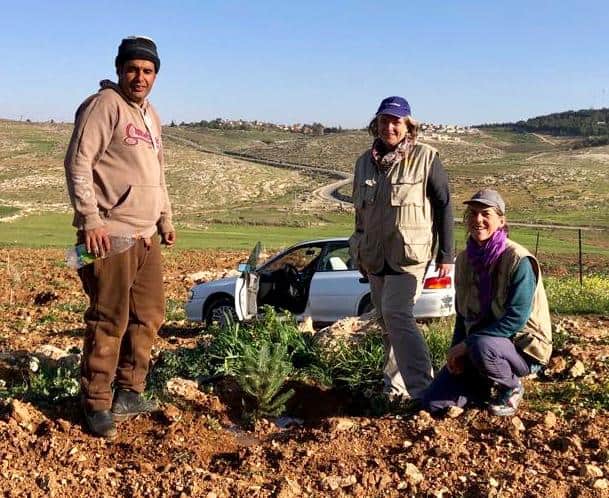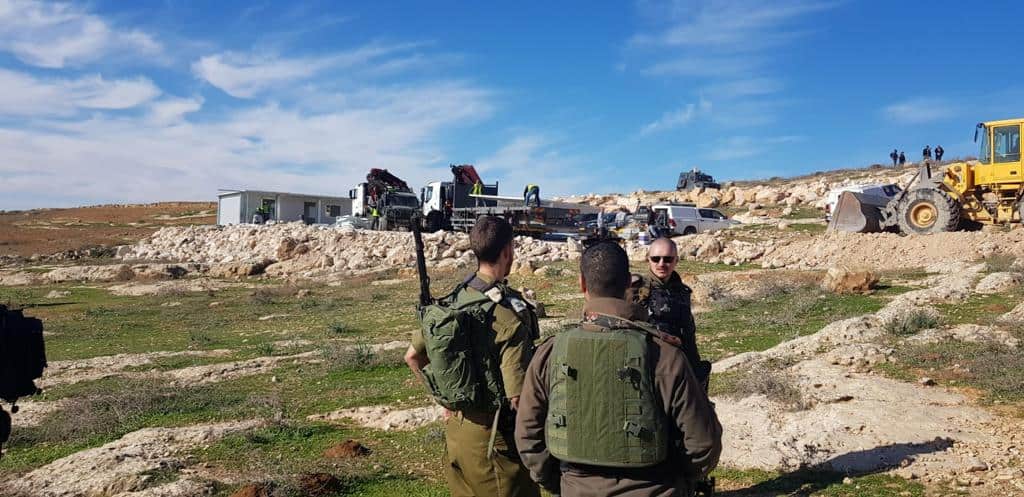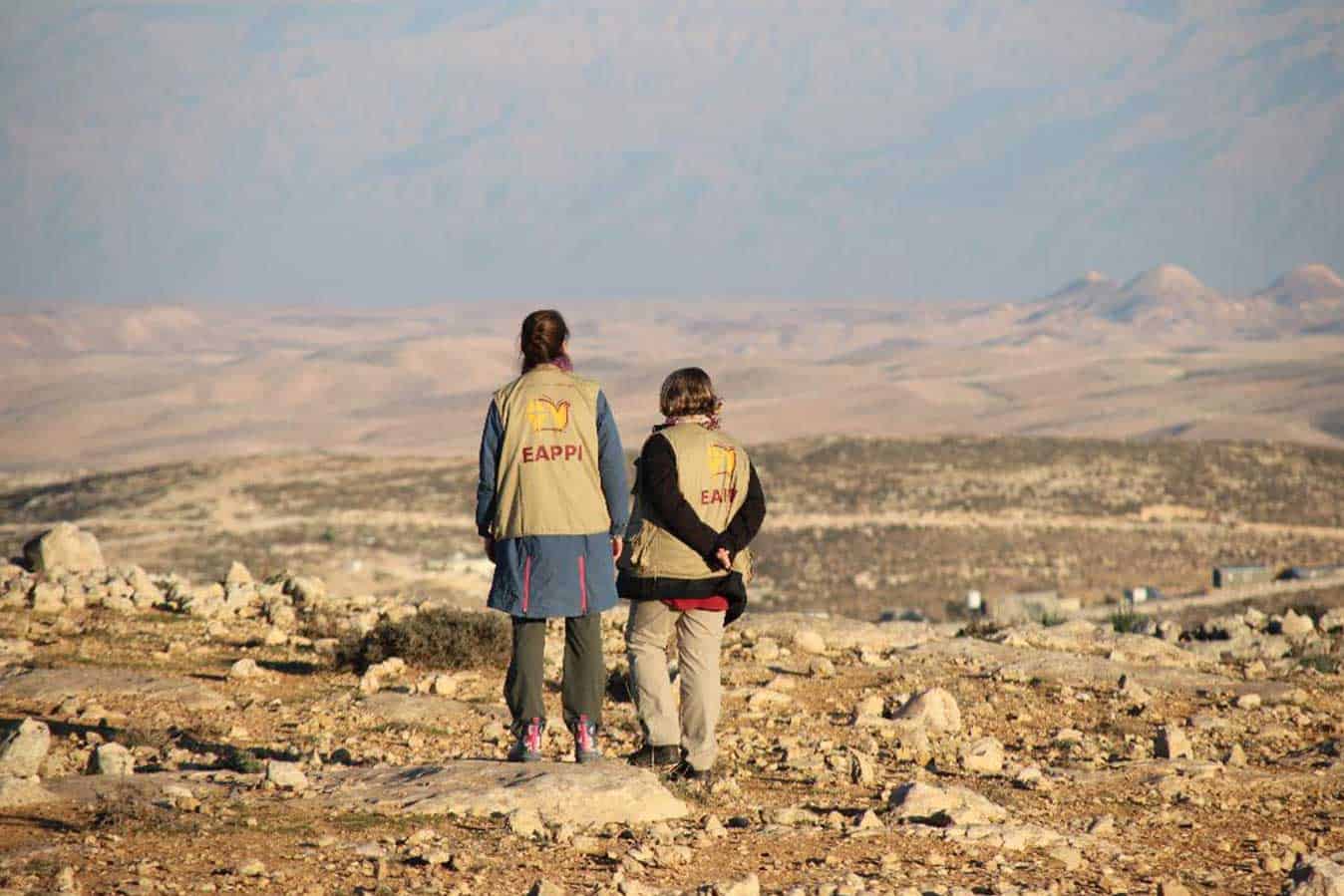Israeli fighter jets, checkpoints, tear gas and building demolitions were frequent hazards for Australian nurse Carolyn Black during her time as an international observer in Palestine.
Carolyn, a long term ANMF member and a perioperative clinical nurse educator (theatre) at Flinders Private Hospital, spent three months in Palestine with the human rights monitoring organisation EAPPI just before COVID in 2018-19.
“I was turning 50 and wanted to do something for my birthday – something worthwhile. I was looking at the possibility of Mercy Ships but saw EAPPI in my Facebook feed. I was hooked. Less than 12 months later I was in Jerusalem on my 50th birthday. As a Christian, being in the Holy Land was incredible.”
The Ecumenical Accompaniment Programme in Palestine and Israel (EAPPI) brings together people worldwide to spend three months living alongside communities under military occupation. By offering a protective presence as an international observer, Ecumenical Accompaniers (EAs) seek to deter and reduce human rights violations in Palestinian communities.
“The hope is that international observation encourages people to do the right thing – someone is watching and so the world is watching,” says Carolyn.
Carolyn was based in Yatta, a city in the south of the Occupied Palestinian Territories (official UN title), which like the rest of the West Bank has been occupied by Israel since the 1967 Arab-Israeli War.
“Occupation has made Palestinian lives really difficult: the various checkpoints when moving from one town to another, having their basic needs such as water and electricity met, and the need to get building permits makes life tough.”
Housing quality and security is one of the biggest problems for Palestinians. Houses are often basic tin construction, much like an Australian garden shed, or just a tent anchored by stones.
“To even have a water tank or Port a loo they have to get a building permit and it’s rare for Palestinians to be able to get a building permit. If Palestinians build without permission, their home can be demolished. So, they don’t spend money improving their property or using expensive materials and housing is quite poorly built.”

Carolyn witnessed the demolition of a local school which was paid for by EU money (80,000 euros) and built without a building permit. The bulldozers moved in and took all the materials away with them.
“It shows the strength of the Palestinian people – the next day they put up a tent on the demolished site and taught the children. The school was attended by about 80 students and the next nearest school is 3.5km away and over a busy road. It’s cold in the winter in the West Bank and hot in the summer. A lot of the kids don’t make it [to school].”
EAs accompany families in their day to day tasks, including escorting children to school and while working on the land, caring for crops, sheep and goats. EAs also visit and support local Israeli and Palestinian peace organisations who are trying to make a difference and build bridges.

“It was a privilege to see this beautiful, rugged landscape and it was incredibly special to be invited to share in people’s lives,” says Carolyn.
The volatility in the region meant the safety situation changed every day. It was not uncommon to see Israeli fighter jets in the skies on the way to bomb Gaza, armed soldiers and heightened security at checkpoints.
“The Palestinians were always concerned for us and our safety. We had someone who took care of our safety and would let us know where it wasn’t safe to go.”
Despite not being there in a nursing capacity, Carolyn was attuned to health risks and healthcare for communities, including the lack of clean water and poor sanitation.
“Fresh water is trucked in to villages and there is no adequate sewerage system. Chemicals from industry sometimes pollute the groundwater.”
“For top level healthcare, patients really need to travel to Jerusalem. Palestinians need permits to travel to Jerusalem to go to the hospital. If there’s been conflict or an Ambulance is stopped at the border checkpoint, you can’t get through.

“Villages are sometimes serviced by mobile medical clinic vans. These are frequently confiscated by the occupation forces if they don’t have the right permits. There is no public transport to access healthcare in larger towns.”
Not only is access to healthcare haphazard, there is little health screening.
“It’s very difficult, they are traditional communities with low health literacy. It’s not just the occupation that’s difficult but living in a developing country that is not well-equipped.”
There was also a lot of mental health problems, namely depression and hopelessness, says Carolyn, but there was also solidarity, “a sense that we’re all in this together”.
“My nursing skills came in very handy being in a conflict zone – listening skills and having a neutral political stance”.
Carolyn says while there are little glimmers of hope, they are not from governments and it’s difficult to envision a political solution, including the official line for a two-state solution.
“There’s people chipping away at the edges and it’s heartening to see the good will,” she says.
Organisations such as ‘Combatants for Peace’ a non-profit, volunteer organisation of ex-combatant Israelis and Palestinians work together to end the occupation of Palestine and bring peace to the region.
“This experience really pushed me out of my comfort zone, it not only has made me a better-rounded person, but a nurse with a greater appreciation for people who have come from difficult situations – 30% of Australians are born outside of this country.
“I think a lot of people shrug when they hear of the problems in the West Bank. If you just read a bit more and find out a bit more about what is really happening there, and hopefully there will be greater awareness and a move for a solution.
Carolyn Black is Peri-operative Education Coordinator at the Flinders Private Hospital. She took three months leave without pay to volunteer for EAPPI.








